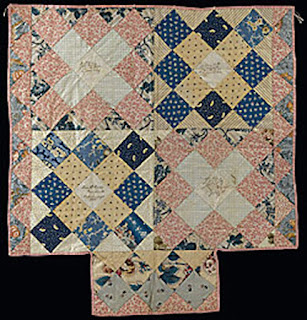https://www.nequiltmuseum.org/index.html
The show featured bedcovers with cut out corners...
Shaped to fit beds with posts at the foot as in this period
room from the Metropolitan Museum of Art.
"This feature is found more often in New England quilts than in those made in other parts of the country...."
So I looked through my picture files for cut out corners.
Quilt they showed last year from Henniker, New Hampshire
From a Maine quilt auction
Bet this one's from Maine too
Corner details from the New England Quilt Museum
Above and below from the Rocky Mountain Quilt Shop inventory
On line auction
From Barb of Fun with Barb
Shelburne Museum
Pam Weeks points out that this one is constructed block-by-block,
what we call potholder style. The blocks are circular with a squeezed square
shape between them. That's why the cut-out is circular.
Dated 1833, Mary Marden, New Hampshire
Pat L Nickols Collection, Mingei Museum
Doll quilts
Jane Katcher Collection
When one sees a quilt with cutout corners one thinks New England,
but we can guess people made these wherever there were four-poster beds to cover.
From Mollie at Fourth Corner Antiques
Susan Pritchard Kirkwood, Charleston South Carolina, 1837
Collection of the International Quilt Study Center & Museum #2008.009.0001
In looking at chintz quilts I've found quite a few Carolina quilts with cutout corners.
The theory is that western immigrants left their four-poster bedsteads behind along the coast
and bought modern beds without the posts for their new homes.
Indianapolis Museum of Art Collection
This beautiful quilt with a fruit panel could be English...
Like this one from the collection of the British Quilters' Guild
(They had four-poster beds too)
I thought I'd look through the dated quilts file and show some circa 1800 American examples
but this is the earliest I could find
Glazed wool bedcover signed 1815 Lucy Arnold
from the Connecticut Historical Society
1818, Louisa Brigham
(I'm not so sure this is an American quilt.)
1818, signed Turner, Maine Historical Society
Interesting that the earliest quilts have square corners. The cut out is a solution to the problem of bunched up bedding around the bedposts. But apparently it took a while to figure out a fix.




























I always like cut out corners, but maybe it's because I've always had footboards and can sympathize with the square cover bunching.
ReplyDeleteI haven't made enough quilts yet, but today, trying to stuff a duvet around the end posts of the guest bed - I need to get cracking with a corner cut out! I think there's the pattern for the replica of a lily with cut out corners, forget which one though.
ReplyDeleteSome of the quilts look like the cut out is rather sloppy! Did they make the cut out after the quilt was already completed?
ReplyDeleteHard to know. Standards weren't quite as high before photography.
ReplyDeleteOne of these chintz quilts reminds me of a question I've been asked recently and didn't know the answer to... Does the term "English paper piecing" mean that the form was 'invented' in England, or is it similar to "English muffin", a name applied by Americans to make it more exotic?
ReplyDeleteI believe that those early Yankees cared less about the "bunching" problem and more about the fabric they were saving. They are still calling us "frugal Yankees".
ReplyDeleteAnd, I think that the Maine State Museum has a few wool quilts with cutouts that may have dates before 1815. You can check with Laurie LaBar.
ReplyDeleteEnglish muffins, French fries, Dutch treat.
ReplyDelete